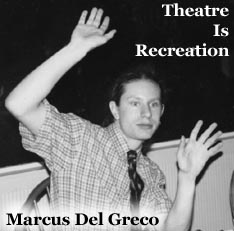In the theatre, we put on "plays." The choice of this word was no coincidence, as recreation and re-creation remain closely related. The following is an attempt to understand the sources of play and their connection to the art of theatre.
The word "play" has been endowed with many meanings. In many senses it is held to represent activity with no real-life goal- a means without an end. Take for example having "play" in a section of rope: there is "extra." Or a young batchelor looking only for "play." But for the thespian a "play" represents the final product of work. Thus creators of theatre join professional athletes in a world where "work" and "play" are not mutually exclusive.
Playing begins, of course, in childhood, and is one of the more innate urges. In its most basic sense, playing is "play-acting," wherein the individual engages in some sort of pretense. If a child, for instance, runs a toy truck along the floor, he is pretending in some fashion that he is controlling a larger truck. Or imagining he is Willy Mays as he chases a wiffle ball to the fence. The pretense is that "real" events are truly occurring.
And they are. But in the microcosm of play (in the context of a "game"), the stakes are artificial. They are fabricated carrots-on-sticks meant to mimic the rewards of "larger" endeavors.
The purpose of play is to prepare for "real" or "larger" events. Play accustoms the body and mind to the kinds of stresses and exertions to be expected from actual happenings. Visualization of a role (in society or onstage) occurs before the role is assumed. So we can assert that there is no such thing as mere recreation. Play forecasts work, and trains us for it.
Recreation, like "play," is a word that demands an understanding of its double sense. At first it suggests simply any activity not considered "productive." This makes it odd to consider that all theatrical productions result from nothing other than pure recreation. We are not ignoring the work that goes into theatre, only viewing "recreation" for what it is. Re-creation.
Of course we never limit theatre to the re-creation of actual events. We re-create any fantasy that occurs to us, because the fantasy becomes experience as soon as it takes places in the mind. In this way we get to choose the "larger" events that recreation examines and prepares us for. And the better we recreate our chosen fantasy, the better prepared we are for the circumstance if the fancy arises in the physical realm.
The artificial stakes of theatre make it a game, make it fun. We are allowed to have an emotion and then walk away from it. And since we are so conscious of stakes and emotions in the creation of theatre, we are interested in finding new combinations of these. New variations. It becomes our obsession as artists to stage an original scenario with new artificial goals for its characters. And though we know it's a game, simply a recreation, we may not always walk away from it without judging ourselves by our proficiency at playing.
Such are games within games. When we decide to call a game "work," we cease to play, in a sense. It is a most unfortunate happening. Theatre is recreation and we must never forget, lest we lose ourselves in the game. You can't "win" at work, only at play.
Play hard, and play to win.





